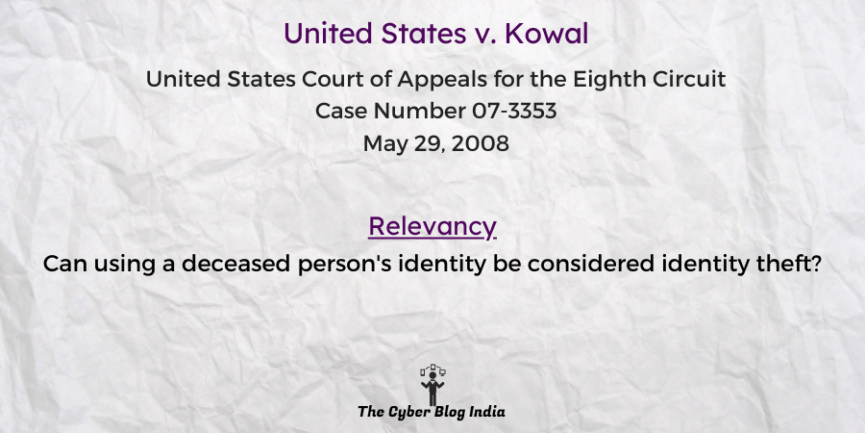United States v. Kowal

United States v. Kowal
527 F.3d 741
In the United States Court of Appeals for the Eighth Circuit
Case Number 07-3353
Before Circuit Judge Murphy, Circuit Judge Colloton, and Circuit Judge Shepherd
Decided on May 29, 2008
Relevancy of the Case: Can using a deceased person’s identity be considered identity theft?
Statutes and Provisions Involved
- 42 U.S.C. § 408
- 42 U.S.C. §§ 1028-1029
Relevant Facts of the Case
- In 1988, the prosecution charged the defendant with multiple counts of theft and forgery related to embezzlement of funds from his employer.
- While facing pending charges, he assumed the new identity of Larry Tipton, who died in December 1944. Utilising his birth certificate, he acquired a driver’s license and social security number in Arizona. Additionally, he applied for a password, which the authorities denied.
- He faced a federal indictment for making a false statement concerning his passport application. He subsequently fled Arizona for California to escape prosecution. Later, the Arizona authorities dismissed his charges in 2001.
- Upon relocating to California, he adopted the identity of William C. Bloom and obtained a California state ID card.
- After returning to Arizona, he resumed living under the identity of Larry Tipton and got married. He applied for a marriage license using his social security number and attempted to change his name to Michael William Tipton. Moreover, he obtained an Iowa driver’s license and a real estate license.
- The defendant faced charges for knowingly and falsely representing his name, social security number, and date of birth. Upon learning of his past, his wife filed for annulment.
- He acquired 17 credit cards from 14 companies under the Tipton and Bloom identities throughout this period.
Prominent Arguments by the Counsels
- The defendant’s counsel argued that the theft of identity does not include the identification of a deceased individual. He contended that the District Court misapplied the amount of loss and asserted that he intended to pay the credit card balances. He did not intend to obtain them with the intent to defraud.
Opinion of the Bench
- The government must prove that the defendant knowingly used the means of identification of another person for a successful conviction.
- The term “person” is not ambiguous in the statute. The defendant’s intention to pay the balances is irrelevant. According to the issuers, dealing with different individuals suggests an intention to defraud.
- The court supports the District Court’s upward departure. The court further noted the defendant’s intention to obtain multiple identities to avoid criminal prosecution in Arizona and California.
Final Decision
- The court upheld the District Court’s judgment.
Yagyanseni Acharya, an undergraduate student at VIT School of Law, Chennai, prepared this case summary during her internship with The Cyber Blog India in January/February 2024.
